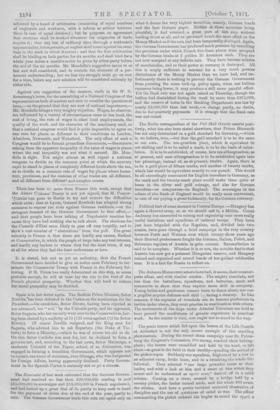Against one suggestion of the masters, made in Sir W.
G. Armstrong's letter, for the assembling of a National Congress of the representatives both of masters and men to consider the questions at issue,—on the ground that they are now of national importance,— Mr. Munclella brings a very weighty objection. Wages, he observes, are influenced by a variety of circumstances more or less local, the cost of living, the rate of wages in other local employments, the quality of the work, and the character of the machinery used, so that a national congress would find it quite impossible to agree on one rate for places BO differeut in their conditions as London, Aberdeen, Newcastle, and Waterford. The only effect of such a Congress would be to foment groundless discontents,—discontents arising from the apparent inequality of the rates of wages in places where the real inequality was not what it seemed. Mr. Man- della is right. You might almost as well expect a national congress to decide on the common point at which the mercury ought to stand in places of completely different levels above the sea, as to decide on a common rate of wages for plasee where house- rent, provisions, and the customs of other trades are all different, and all different from different mid complex causes.


































 Previous page
Previous page